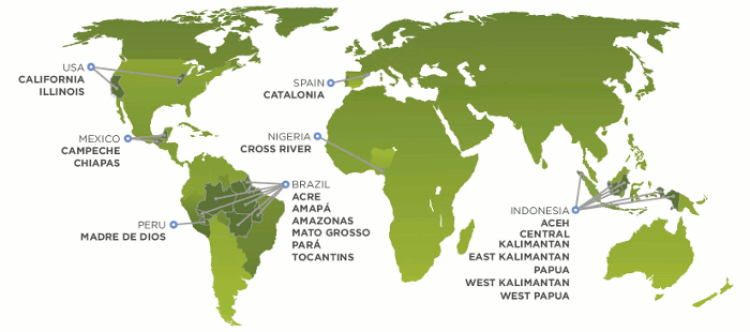Energy & Environmental Policy Innovation Program
The Energy & Environmental Policy Innovation Program supports research, analysis, and ongoing activities in the United States and throughout the world to build networks for collaboration, cross-jurisdictional learning, and innovative policy approaches to pressing energy and environmental problems. Our Energy Innovation Initiative and our work with the Governors' Climate and Forests Task Force provide two examples of this work. William Boyd directs the Energy & Environmental Policy Innovation Program at the Getches-Wilkinson Center.
Energy Innovation Initiative
The Energy Innovation Initiative is a joint venture of the Getches-Wilkinson Center on Natural Resources, Energy, and the Environment and the Silicon Flatirons Center on Law, Technology, and Entrepreneurship. Established in 2011, the Energy Innovation Initiative brings together leaders from government, law, finance, industry, and academia to address key aspects of the energy innovation challenge and develop new approaches and solutions across a range of sectors. Drawing on Colorado Law’s deep expertise in technology, entrepreneurship, energy, and natural resources, the Initiative supports research and analysis on the critical policy, regulatory, and business aspects of the energy innovation challenge; training for students and professionals; and an ongoing series of public lectures, workshops, and conferences. Professor William Boyd serves as the faculty director of Colorado Law’s Energy Innovation Initiative.
Over the last two years, the Initiative has hosted Senator Jeff Bingaman, FERC Commissioner Tony Clark, celebrated author and energy expert Daniel Yergin, former Colorado Governor Bill Ritter, DOE senior advisor Lauren Azar, CEQ deputy for energy and climate Jason Bordoff, and many others to address various aspects of the energy challenge, and has convened conferences and workshops on smart grid, the role of public utility commissions (PUCs) in clean energy innovation, the changing energy mix, and financing energy innovation.
The Initiative is also supporting and participating in ongoing research collaborations on grid modernization, PUCs and clean energy innovation, and unconventional natural gas development. On this last topic, Professor Boyd, along with Energy Innovation Initiative Senior Research Fellow Elizabeth Paranhos, participated in a recent multi-author study led by the Joint Institute for Energy Analysis (JISEA): Natural Gas and the Transformation of the U.S. Energy Sector: Electricity. The Initiative has developed partnerships with NREL, JISEA, CU-Cleantech, and the Renewable and Sustainable Energy Institute (RASEI), and is supported by Holland & Hart LLP, Fulbright & Jaworski LLP, Wilkinson Barker Knauer, LLP, Simple Energy, and Tendril.
Governors' Climate & Forests Task Force (GCF)

With ongoing support from the Gordon & Betty Moore Foundation and the ClimateWorks Foundation, Professor Boyd and his team (Julie Simmonds, Carly Hernandez, and Amelia Peterson) continue to lead the Secretariat for the Governors’ Climate and Forests Task Force (GCF). Established in 2009, the GCF is a unique subnational collaboration between 19 states and provinces from Brazil, Indonesia, Mexico, Nigeria, Peru, Spain, and the United States that seeks to advance jurisdictional programs for reducing emissions from deforestation and land use and link these activities with emerging greenhouse gas (GHG) compliance regimes and other pay-for-performance opportunities.
More than 20% of the world’s tropical forests are in GCF states and provinces, including more than 75% of Brazil’s and more than half of Indonesia’s. The GCF includes states and provinces that are leading the way in building comprehensive, jurisdiction-wide approaches to reducing deforestation and low emissions development as well as the only jurisdiction in the world (California) that is considering provisions that would recognize efforts to reduce emissions from deforestation and forest degradation (REDD+) as part of its GHG compliance system.
The GCF focuses on all aspects of the effort to reduce emissions from deforestation and establish lasting frameworks for low emissions development by sharing experiences and lessons across leading states and provinces, synchronizing efforts across these jurisdictions to develop policies and programs that provide realistic pathways to forest-maintaining rural development, supporting processes for multi-stakeholder participation and engagement, and securing financing for jurisdictional programs from a range of sources, including pay-for-performance public finance, carbon markets, and ongoing efforts to de-carbonize agro-food supply chains.
The GCF has also established an independent GCF Fund to support collective needs and innovative proof-of-concept activities in GCF states and provinces and has secured an initial seed grant from the U.S. Department of State for the Fund. Key partners in the GCF effort include IDESAM (Brazil GCF coordinator), Kemitraan (Indonesia GCF Coordinator), ProNatura Sur (Mexico GCF coordinator), IPAM (GCF science and technical advisor), Climate Focus (European Partnerships), Carnegie Institution for Science, Woods Hole Research Center, Google Earth Engine, and many others.



